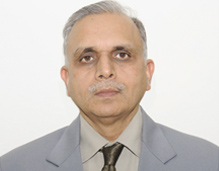India in a Changing Global Nuclear Order

Publisher: Academic Foundation (2009)
ISBN 978-81-7188-770-5
Rs. 895 []
About the Book
As the world witnesses a flux in the nuclear world order—in terms of civilian nuclear energy as well as non-proliferation regime and legitimacy of nuclear weapons, India has a cautious path to tread to achieve its energy security, nuclear security and make its disarmament calls more plausible and practical. The challenges before the global nuclear order have vindicated India’s position and bestowed it with an opportunity to play a more confident and active role in reshaping the world—towards a more reliable, democratic and universal non-proliferation regime, preventing nuclear terrorism, forming a better architecture for civilian nuclear trade, and finally to evolve practical and universal steps towards comprehensive disarmament. This insightful book, with contributions by leading experts on the nuclear issue in India, covers all such important aspects and provides robust analysis of the global nuclear order in terms of its implications for India and global disarmament.
About the Editor
Arvind Gupta is member of the Indian Foreign Service. Presently he holds the Lal Bahadur Shastri Chair in Defence and Strategic Studies at the Institute for Defence Studies and Analyses (IDSA), New Delhi. He is Director of Studies at the Indian Pugwash Society.
Content in Detail
About the Editor/Contributors
Preface
1. Introduction
— K. Subrahmanyam
Section I:
Relevance of Nuclear Energy
2. Role of Nuclear Energy in India’s Energy Mix
— R.B. Grover
3. Nuclear Energy for India’s Energy Security
— Manpreet Sethi
4. Technological Challenges Associated with Global Resurgence of Nuclear Energy — Amitav Mallik
5. Global ‘Renaissance’ of Nuclear Power: Drivers, Issues, Prospects
— S. Samuel C. Rajiv
Section II:
Perspectives on the Indo-US Nuclear Cooperation
6. The Indo-US Nuclear Deal: Opportunities and Challenges
— M.R. Srinivasan
7. The Indo-US Civil Nuclear Cooperation and Safeguards
— Rajiv Nayan
8. India and the Nuclear Suppliers Group: From Estrangement to Engagement?
— Arun Vishwanathan
Section III:
India and International Non-Proliferation Efforts
9. India’s Nuclear Diplomacy and the Global Order
— C. Raja Mohan
10. Crisis in the NPT, Counter-Proliferation Regimes and India’s Approach
— Arvind Gupta
11. India and the Fissile Material Cut-off Treaty (FMCT)
— Arundhati Ghose
12. A Counter-Proliferation Strategy for India
— A. Vinod Kumar
13. Criminalisation of Proliferation
— Arun Vishwanathan
Section IV:
Conclusion
14. Conclusion: India in a Changing Global Order
— Rajesh Rajagopalan
Section V:
Appendices
A-1 India-US Bilateral Nuclear Cooperation Agreement
A-2 ‘Non-Papers’ Circulated by Israel in the NSG
A-3 Official Text of the Hyde Act
A-4 Proliferation Security Initiative: Statement of Interdiction Principles
A-5 Convention for the Suppression of Unlawful Acts against the Safety of Maritime Navigation, 1988
A-6 United Nations Security Council Resolution 1540 (2004)
A-7 Third and Final US Draft Circulated to the NSG Members at the September 4-5, 2008 Meeting
A-8 India-IAEA Safeguards Agreement (Draft Text)
A-9 The Weapons of Mass Destruction and their Delivery Systems (Prohibition of Unlawful Activities) Act, 2005
Index
Contributors
Arundhati Ghose is a former Indian Permanent Representative to the Conference on Disarmament. She is currently on the Executive Committee of the Indian Pugwash Society, New Delhi. She is also on the editorial board of Disarmament Times (New York).
R.B. Grover is a Distinguished Scientist and Director, Strategic Planning Group, Department of Atomic Energy, Mumbai.
A. Vinod Kumar is Associate Fellow, Institute for Defence Studies and Analyses, New Delhi.
Amitav Mallik is a defence technologist and strategic analyst. He was formerly Director, LASTEC, Delhi and Member, NSAB (2003-2006).
Rajiv Nayan is Research Officer with the Institute for Defence Studies and Analyses, New Delhi.
Rajesh Rajagopalan is Professor in International Politics at Centre for International Politics, Organisation and Disarmament, School of International Studies. He has authored a book titled: Second Strike: Arguments about Nuclear War in South Asia.
C. Raja Mohan is Professor, Rajaratnam School of International Studies, Singapore. Formerly, he was the Convenor of the Indian Pugwash Society and member of the National Security Advisory Board, Government of India.
S. Samuel C. Rajiv is a researcher with the Institute for Defence Studies and Analyses, New Delhi.
Manpreet Sethi is a Senior Fellow at the Centre for Air Power Studies, New Delhi. She has written extensively in national and international journals on nuclear power, proliferation and disarmament. She is author of Argentina’s Nuclear Policy and co-author of Nuclear Deterrence and Diplomacy.
N.S. Sisodia is the Director General, Institute for Defence Studies and Analyses (IDSA), New Delhi. He holds an Honours degree in History from the University of Delhi and a Masters degree from the Harvard University, USA where he was a Mason Fellow.
M.R. Srinivasan is former Chairman, Atomic Energy Commission. He is currently a member of National Security Advisory Board, Government of India.
K. Subrahmanyam is India’s leading strategic analyst. Formerly, he was the Convenor of the first National Security Advisory Board and Director, Institute for Defence Studies and Analyses, New Delhi.
Arun Vishwanathan is Associate Fellow, Indian Pugwash Society, New Delhi.
Order Hard Copy
Please email us at publication [at] idsa.in or call +91-11-2671 7983 (Ext. 7322)









